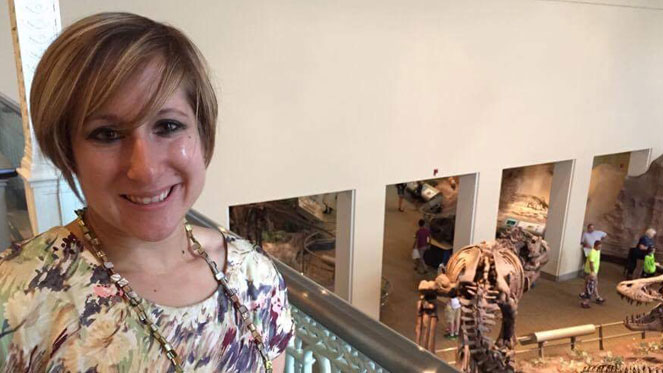
Looking Forward in Women's History
By Ann Lyon Ritchie
Browsing popular bookstores, Lauren Churilla can't help but notice the predominance of male figures in history books. She is one history scholar who sees an opportunity to reverse the trend.
Churilla joined Dietrich College of Humanities and Social Sciences' Department of History two years ago as a graduate student. She is also a full-time curator at St. Vincent College's Foster and Muriel McCarl Coverlet Gallery. She currently pursues a research interest in women empowerment and self-defense tactics from 1880-1930.
Through prior undergraduate and graduate studies, Chrurilla always focused on women in American history, but she has had to select courses specializing in women or feminist topics. Women's roles have been absent from traditional studies of history. Even the 19th century fiber arts pieces Churilla curates for the gallery are a collection of artifacts made by men.
"Many history texts have not included women but they were involved in important changes. Women, African Americans, Native Americans—they were all present and part of the same story," Churilla said.
Churilla seeks to write about the achievements of people left out of existing stories to include "all of the various actors" of history.
Lisa Tetrault, associate professor of history at Carnegie Mellon University and an award-winning scholar of first-wave feminism, has been a graduate advisor perfectly matched to her pursuit.
"Women's history has always been my interest. Lisa is just a fantastic mentor," Churilla said.
Tetrault ask Churilla to sit in on her popular undergraduate courses, including Body Politics: Women and Health in America, about women within the medical system, and Women, Politics and Protest, which explores women's movements from the 19th century through today.
Tetrault's book "The Myth of Seneca Falls: Memory and the Women's Suffrage Movement, 1848-1898" was the first to ask how and why feminism in the U.S. came to be rooted in the 1848 women’s rights meeting in Seneca Falls, NY. This is typically used as a beginning date and popularly accepted. But Tetrault was skeptical, believing stories are made, not found, asking, “Who made that story and why? And with what consequences?”
Her provocative conclusions have upended this familiar tale and won her the 2015 Organization of American Historians' Mary Jurich Nickliss Book Prize in U.S. Women’s History.
With courses and mentors specializing in women's contributions, a new generation of historians may be able to redefine roles of women in history—and reshape the look of shelves in bookstore history sections.
"When we include the contributions of women, history looks different, and more importantly, its lessons are radically different," Tetrault said. "We can’t have justice in the present without justice in the past."
Today's scholars at Carnegie Mellon see an opportunity, and the responsibility, to bring such stories to light.